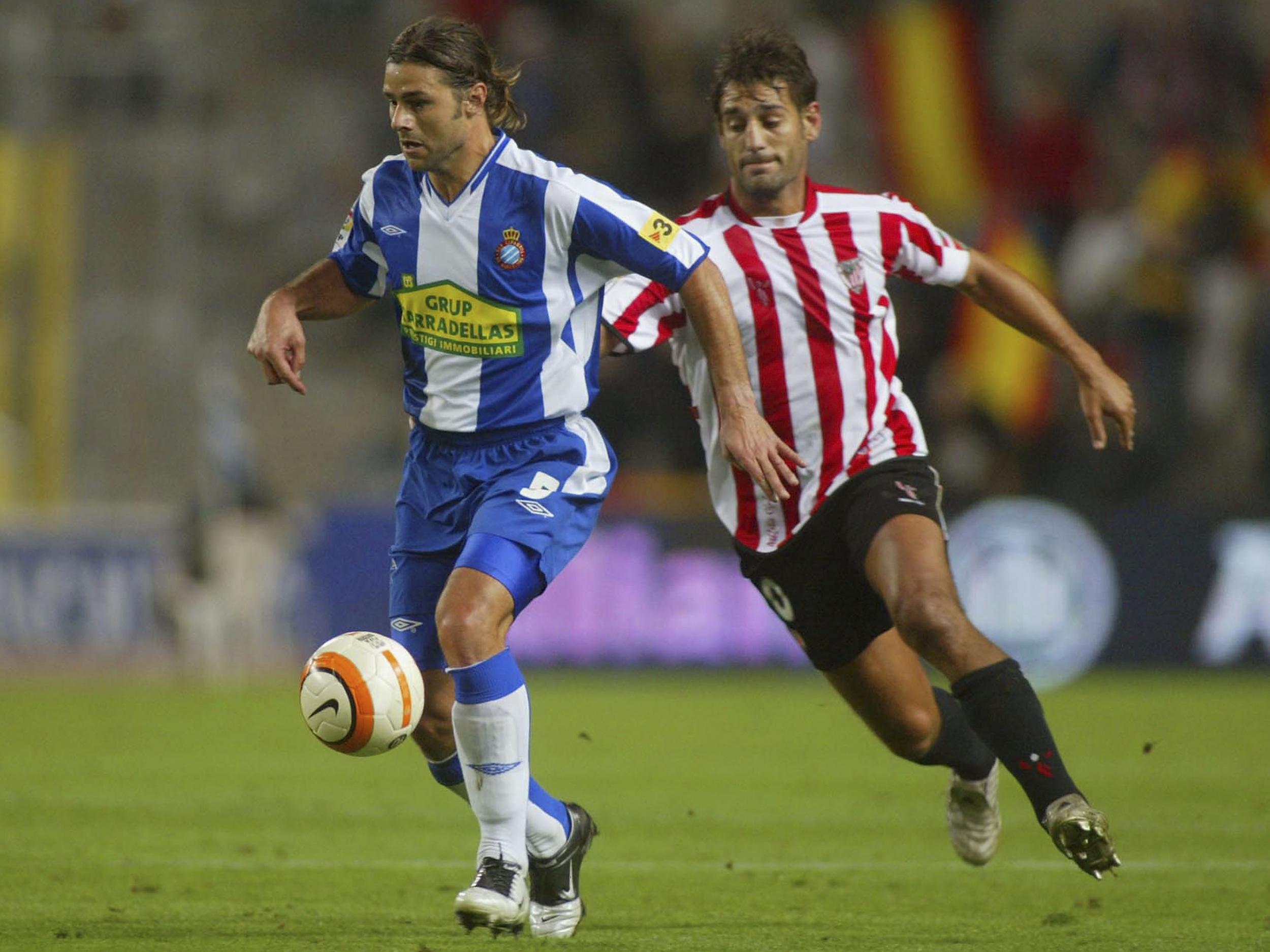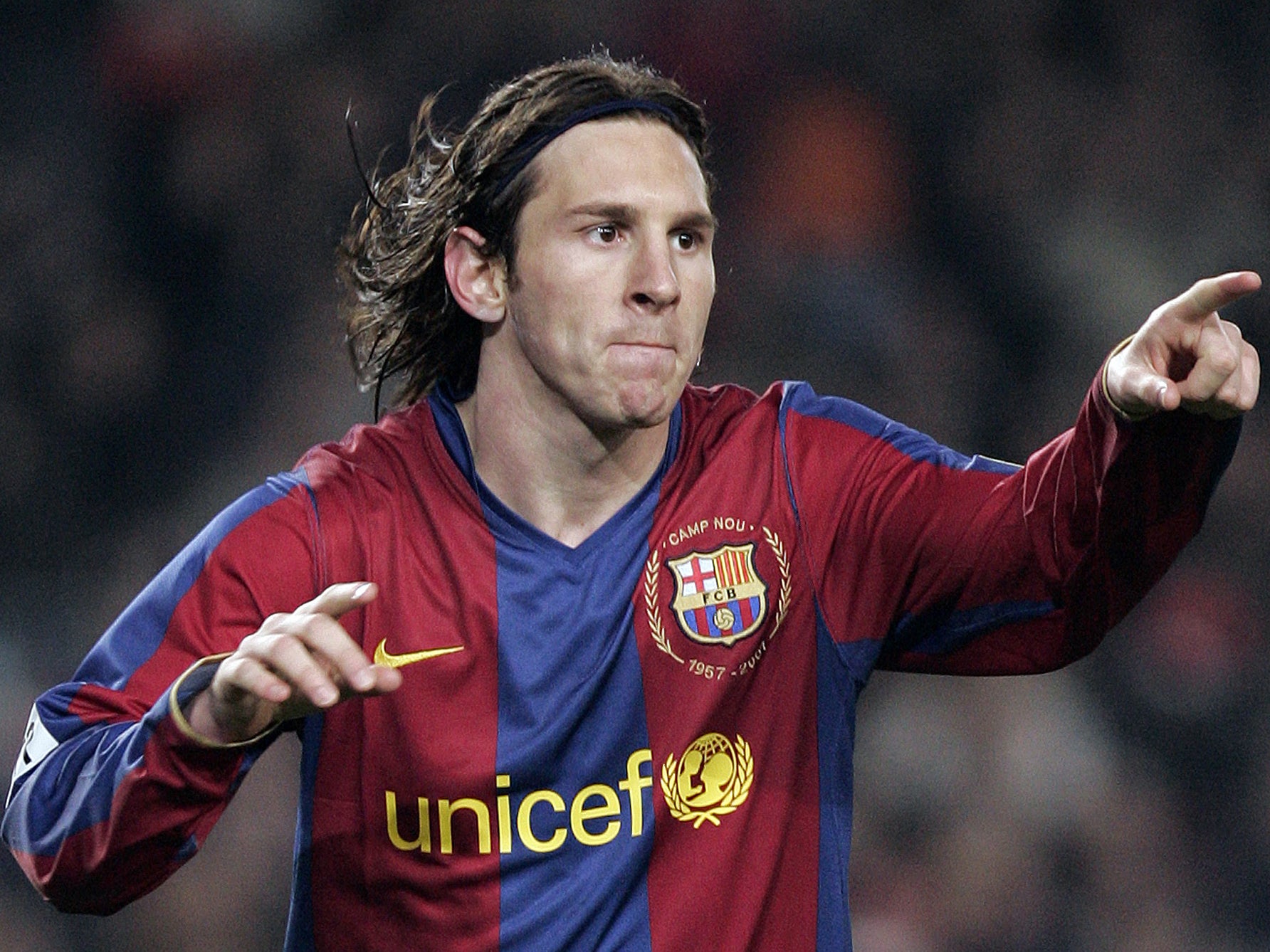How Lionel Messi's record-breaking Barcelona career might never have come to be
Mauricio Pochettino recalls the story of how Espanyol, his old club, tried and failed to recruit Messi as a youngster

Your support helps us to tell the story
From reproductive rights to climate change to Big Tech, The Independent is on the ground when the story is developing. Whether it's investigating the financials of Elon Musk's pro-Trump PAC or producing our latest documentary, 'The A Word', which shines a light on the American women fighting for reproductive rights, we know how important it is to parse out the facts from the messaging.
At such a critical moment in US history, we need reporters on the ground. Your donation allows us to keep sending journalists to speak to both sides of the story.
The Independent is trusted by Americans across the entire political spectrum. And unlike many other quality news outlets, we choose not to lock Americans out of our reporting and analysis with paywalls. We believe quality journalism should be available to everyone, paid for by those who can afford it.
Your support makes all the difference.Back in the summer of 2005, an 18-year-old Lionel Messi was still wondering how to make his way into professional football, and whether Barcelona was the right place to get his foot in the door.
Messi had only been a fringe player in the 2004-05 season, introduced for a few minutes here and there. He was still just a rumour, a promise. He did not have Spanish citizenship, meaning he was competing with far more experienced players for the three non-European slots in Frank Rijkaard’s team. Until a passport came through, he was in legal limbo.
Then Jose Pekerman, the Argentina coach, told him he would need to play at least 20 La Liga matches in 2005-06 to be part of his squad for the World Cup in Germany. The implication was clear, especially to Messi himself: he would have to move to play. There was interest from Glasgow Rangers and PSV Eindhoven, and Inter Milan were willing to meet his €150m release clause and treble his salary.
But the best option, and the one Messi wanted, lay closer to home. Espanyol, Barcelona’s city rivals, had just signed Messi’s best mate Pablo Zabaleta, after he had shone alongside Messi winning the Under-20 World Cup for Argentina. The Messi family would not even have to move.

So his father Jorge Messi, keen on the idea, asked Barcelona’s academy head to speak to his opposite number at Espanyol about the possibility of taking little Lionel on loan for the season. Josep Manuel Casanova, taking the call, ran to go and put Espanyol’s top brass on speaker: president Dani Sanchez Llibre, coach Miguel Angel Lotina and technical director Tintin Marquez. They could barely believe their ears.
It would have been a sensation, Messi at Espanyol, and Lotina was leaning hard on Zabaleta to convince his friend to join. Messi was certainly open to it. Almost as enthused was veteran centre-back Mauricio Pochettino. He was 33 years old then, in his second spell at the club, but he knew all about Messi. Both players had come through Newell’s Old Boys in Rosario, although Pochettino left for Espanyol at the age of 22, having won two Argentine league titles. Messi left for Barcelona aged 13 and a half.
So what went wrong? Why does Pochettino tell this story now with a wry chuckle about what would have been, what he and Messi might have achieved together, all the trophies that his beloved Espanyol would have won? Why did such a logical move never go through?
Because Messi soon made clear that he was so illogically good that the prospect of any team letting him play for anyone else was preposterous.
It was 24 August 2005, and the annual Joan Gamper Trophy game at Camp Nou. Barcelona welcomed Juventus, one year before Calciopoli destroyed them. Managed by Fabio Capello, they had Fabio Cannavaro, Giorgio Chiellini, Patrick Vieira, Alessandro del Piero and Zlatan Ibrahimovic. But none of those players could do anything to stop the teenager making his first start for the club. Messi started out with a Cruyff turn to get away from Cannavaro, and he never looked back.
Remember that everything we now take for granted with Messi – the control, the awareness, the speed, the imagination, the impudence, the efficiency – was at this point almost completely unknown. Remember that feeling of watching Messi for the first time, as if an unknown light had been switched on in a dark room. And now imagine how much more powerful it must have been for all the 90,000 fans in the Nou Camp, or the 21 other players on the same pitch.
At one point Vieira tried to put his body in between Messi and the ball, to hold him off. It is a move that Vieira had some success with over the years, given his size and strength, and in August 2005, just over one year after the Invincibles season, 29-year-old Vieira was still at his physical peak. So Messi, half Vieira’s size, dropped down on his right knee, stuck his left leg in between Vieira’s, hooked the ball away and scampered away with it. So Vieira took out his embarrassment on Messi’s ankles, one of three Juventus players to get booked for fouling him.
It was nothing less than a masterclass, delivered by the youngest player on the pitch. The first goal came from a move that is now characteristically Messi, but back then was still difficult to comprehend: he wriggled away from Mauro Camoranesi in midfield, spotted Andres Iniesta’s run in behind and cut five Juventus players out of the game with a perfect through pass. By the end, the capacity crowd were chanting his name for the first time and Rijkaard took him off in the last minute so he could get the ovation.
In the technical area, Capello turned to Rijkaard and asked if Juventus could sign Messi. Because if Barcelona could not legally pick him, then it would be a waste to football for this unique player to sit in the stands. But what really made the difference, and what changed the future for Messi, was what Capello said in the press conference afterwards. “I have never seen a player with so much quality at that age, with such personality, wearing such an important shirt,” enthused Capello. “He can do what he likes with the ball. I am happy that a boy so young does something so beautiful for football. It is an advertisement for the game.”

And that judgement from the great Capello, whose Milan team dismantled’s Johan Cruyff’s Barca in 1994, did more to change minds than even the performance on the pitch. They could not possibly let him go. The next day El Pais wrote that it would be a “crime” if Messi were not to play for them. The loan was off. “I heard he was so close to signing for Espanyol, very close,” Pochettino looks back. “Because he was so fantastic in the Joan Gamper, Capello praised him afterwards in the press conference. They changed their minds. They kept Messi at Barcelona.”
Barcelona hurriedly prepared a new deal for Messi, and made clear to Massimo Moratti too that a sale was unthinkable. The Spanish authorities were also prompted into action and it did not take them very long after that to grant Messi Spanish citizenship.
But on the other side of Barcelona, there was only a sense of missing an opportunity that would never come round again. Lotina would not get pick to Messi, Zabaleta would not be reunited with his best friend, and Pochettino would not get to play with his fellow leprosofrom Newell’s. They could only watch sadly from across the city as Messi helped Barcelona to title after title after title, conquering Spain, Europe and the world, establishing Barca as the biggest and best club in the game.
Looking back 13 years on, ahead of their meeting at Wembley this week, Pochettino can laugh about what might have been had that loan move happened. And what it would have meant for the relative statuses of the two Barcelona clubs, if it was Espanyol who had been spurred on by the little teenager. “If you look back in history, maybe if Messi did not play in the Joan Gamper in that summer, maybe today he could have been the biggest star in Espanyol. Espanyol should be the Barcelona!”
Barcelona are still Barcelona, and Messi is still their star, now more than ever. And Pochettino knows that any occasions when anyone can share a pitch or a stadium with Messi are precious, especially now he is 31 years old. That means that his message to his players ahead of Wednesday night is not the normal one. Managers usually insist when asked about specific opponents that they do not want to talk about individuals, that they have “no special plans” for them, or that they would have their own players in fact. For Pochettino there was none of that point-missing bluster.
“I am not going to try to find a solution,” Pochettino said. “I am going to say to the players, ‘enjoy playing against Messi!’ Because you are going to have the opportunity to play against one of the best players in the history of football. More than worrying you, that needs to excite you to play. So you can say ‘I played against Messi’, like ‘I played against Maradona’ or ‘I played against Ronaldo’. This is the type of player that you are going to remember. For your ego, it’s a thing that you are going to tell your kids and grandkids. Sometimes my kids say to me, ‘you played with Maradona’, and they are so proud. So enjoy it. Enjoy playing against Messi. It’s difficult to find solutions to try to stop him, I think it’s impossible.”
Many at Wembley on Wednesday night will feel the same way. Just like the 90,000 did at the Nou Camp for that first great revelation: thrilled to the point of disbelief, but above all grateful, to be alive when Messi was playing football, and to be sharing the same space.
Join our commenting forum
Join thought-provoking conversations, follow other Independent readers and see their replies
Comments